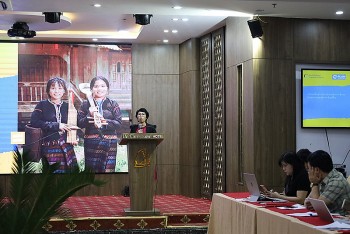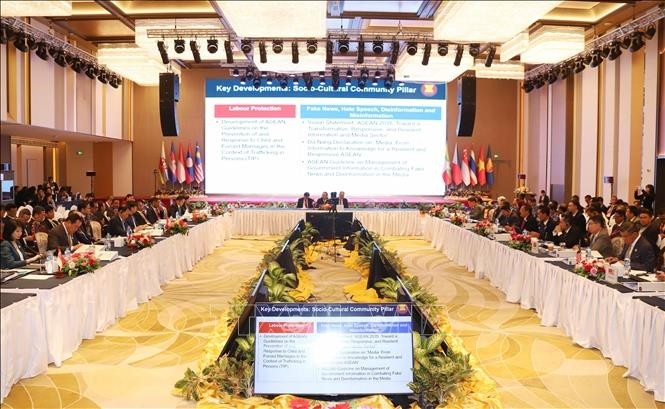ASEAN Strives to Prevent Online Scams
Online scams on the rise
In the context of a rapidly rising digital economy, e-commerce has become an inevitable trend in social life, with an increasing proportion of people using computers, smartphones, and social networks. However, in addition to the benefits of the Internet, an increasing number of online scams are springing on consumers, posing a serious risk even to the most cautious persons.
Online fraud, as an industry, has a profit margin of 2,500% in 2023 and is predicted to grow even more in 2024. There is no other industry that has such high-interest rates. Aaron Elliot Gross, Head of Financial Crime and Fraud at Revolut, a Financial Technology Company, warned of a growing trend of sophisticated criminal networks using social media channels to defraud people. They use deception tactics, such as financial investment schemes, to entice people to make transactions. According to studies, the amount of money conned online globally will reach 53 billion USD in 2023.
According to a top UN official, the rings that run Asia's massive internet fraud industry are active in Southeast Asia. They create fake bank accounts to offer "romantic" intentions, high-risk investments with huge profits, or impersonate police authorities to demand ransom. ASEAN countries, in particular, are concerned about the issue of traffickers. People have used the advancement of technology, particularly social networks, to carry out fraudulent acts. They approach victims through social networks, directing them to fraud centers dealing with online gambling, cryptocurrencies, and online loans. In particular, victims tend to be people with few job options in their own country.
 |
| Japanese suspects accused of being involved in phone fraud were deported from Cambodia in November 2023. (Source: An ninh thu do) |
The GASA, an international organization specializing in alerting, detecting, and combating online fraud said that each Vietnamese person experienced 0.8 online fraud in 2023, according to a survey. There are 24 common types of fraud, including the cheap travel combo scam, the deepfake video call scam, the scam to recruit online collaborators, stealing citizen identification information to borrow credit, selling fake and counterfeit goods through e-commerce platforms, and impersonating police, court officials, and prosecutors, accusing victims of participating in cases and tricking victims into following instructions to appropriate property.
Royal Thai University Suan Dusit in Thailand performed a statewide online study on phone fraud activities in 2022. According to the findings, 21.02% of respondents claimed to be personally defrauded over the phone. In Malaysia, the Communications and Multimedia Commission reported 785 allegations of online fraud related to social networks such as Facebook, Telegram apps, WhatsApp, Instagram, and email in the first six months of 2023. According to Singapore Police Force figures, the number of victims of online fraud grew by 64.5% in the first six months of 2023 compared to the same period last year.
Accordingly, 52% of those aged 18 to 34 are vulnerable to internet fraud. In comparison, the elderly (aged 55-65 years and above) are the least likely to be victims of fraud, with a 14% chance.
Preventive measures of ASEAN countries
Ensuring security, including cyber security, is a key aspect of the ASEAN region's prosperity. As a result, ASEAN countries and each member are striving to identify solutions to combat cybercrime. The ASEAN Cybercrime Steering Committee was formed to assist governments in preventing this type of crime. The executive board distributes cyber activity reports to ASEAN member countries, giving insight into cyber dangers such as malware infections, business email compromise fraud, cryptocurrency attacks, and web browsing.
In particular, at the 42nd ASEAN Summit in May 2023, leaders of ASEAN countries adopted a joint statement on combating human trafficking due to the abuse of technology such as social networks and online platforms. ASEAN member states agreed to strengthen cooperation in crime prevention through regional mechanisms and initiatives of the association; use technological tools; share best practices and experience lessons; exchange information; conduct exercises and coordinated operations; and conduct general investigations related to preventing online human trafficking crimes.
Each ASEAN member state also takes countermeasures. From January 5, 2024, all phone networks in Singapore, including Singtel, Starhub, M1, and Simba, will be able to allow customers to ban international calling numbers to avoid phone fraud. Network operators are anticipated to expand the feature to block foreign messages by mid-June of this year. Singapore police collaborate with technology companies such as Meta and Google to combat social network fraud. The solution is for Meta network to quickly ban Whatsapp accounts that are found to be used for fraud. In addition, Google will take proactive actions to check and block links that lead to fraudulent websites.
In Thailand, the government has approved a draft of an emergency decree on fighting online fraud, allowing financial institutions to temporarily suspend suspicious transactions to conduct inspections and monitoring activities. Telecommunications companies are also allowed to exchange customer data with each other and grant access to this data to the Royal Thai Police, the Thai Anti-Money Laundering Office, and other competent authorities. Hotline 1441 of the Anti-Fraud Operation Center has been established, thereby connecting Internet service providers, banks, police, and telecommunications companies in the fight against online fraud.
Malaysia has promoted education to raise young people's awareness of employment fraud. This instruction is delivered through hotlines, interactive forums on social media platforms such as X, Facebook, and Instagram, as well as workshops in schools and local communities. Malaysia will formally commence a national fight against digital platform fraud in February 2023. The campaign is participated by functional forces, cyber security centers, and telecommunications companies.
According to Globe Telecom figures, frauds via banking SMS or calls fell by up to 85% in the Philippines in 2023. This is the result of this telecoms company's collaboration with the Philippine National Banking, which includes 45 banks and other financial system participants. Effective cooperation is also enabled by Philippine government legislation mandating all telecommunications firms and financial institutions to be held accountable for illegal or improper payment activities, including compensation for victims of fraud.
 | Online Safety for Children More Imperative Than Ever Quang Binh province launches community-based project to support children experiencing violence and abuse in cyberspace. |
 | Online Discussion Panels to Spread Meaningful Youth Messages From September 25-27 in Hanoi, many meaningful activities within the framework of the National Congress of Advanced Youngsters following Uncle's Teachings 2023 such as a ... |
 | Improving Child Safety on Online Environment On November 30, World Vision Vietnam coordinated with the Vietnam Information Security Association (VNISA), Vietnam Cyber Safety for Children Club (VCSC), and other organizations to ... |
Recommended
 World
World
Pakistan NCRC report explores emerging child rights issues
 World
World
"India has right to defend herself against terror," says German Foreign Minister, endorses Op Sindoor
 World
World
‘We stand with India’: Japan, UAE back New Delhi over its global outreach against terror
 World
World
'Action Was Entirely Justifiable': Former US NSA John Bolton Backs India's Right After Pahalgam Attack
Popular article
 World
World
US, China Conclude Trade Talks with Positive Outcome
 World
World
Nifty, Sensex jumped more than 2% in opening as India-Pakistan tensions ease
 World
World
Easing of US-China Tariffs: Markets React Positively, Experts Remain Cautious
 World
World








